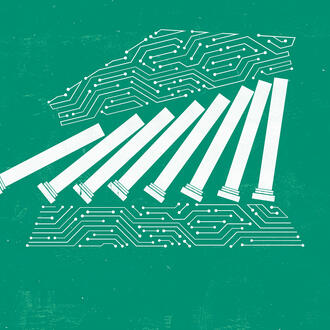Ideas Made to Matter
Fintech
Alumni-led Destácame helps middle class prove credit in Latin America
In the United States, applying for a loan follows a typical — if occasionally nerve-wracking — process. We fill out an application and await a score from the big three credit agencies: Experian, Equifax, and Transunion. A higher score is better, of course, and allows lenders to evaluate our ability to repay a loan. A good score also means a favorable interest rate.
As MIT Sloan alumnus Jorge Camus, MBA ’14, explains, much of Latin America lacks such systems. Many people who want to apply for small business loans, mortgages, or credit cards have no way to display credit-worthiness to banks, which instead rely on subjective evaluation methods — such as an applicant’s home address or income. This makes it nearly impossible for many middle-class people to obtain loans. According to Camus, almost half of all Latin Americans are under-banked.
His Chile-based company, Destácame, aims to help this population with a free credit-ranking service. Customers enroll online and enter account numbers for their utility bills. Destácame’s software than analyzes a user’s yearlong payment history and renders an objective score based on a proprietary algorithm developed at MIT. The score is private but shareable with lenders at a user’s discretion. Destácame is working closely with three major Chilean banks to use the data, with more to come. The free service currently has roughly 5,000 subscribers.
“Destácame allows customers to be evaluated on a fair, consistent, and objective basis,” says Camus, who founded the company with fellow MIT Sloan graduates Augusto Ruiz-Tagle and Sebastian Ugárte, both MBA ’14.
Camus hopes that the service empowers credit-worthy Chileans who have been marginalized by the current system.
“Destácame helps users to demonstrate to banks and financial institutions that they’re good payers. This score belongs to the user, so it’s the user who decides with whom and when it’s shared. This service is voluntary and free for the users, and the financial institution pays for the information,” Camus explains.
Destácame also helps users streamline their financial lives: It reminds enrollees when bills are due, thereby helping to boost scores, and provides special offers from banks and retailers.
Camus hopes this will disrupt a financial system that only focuses on high earners.
“Our main goal is to help underprivileged people to improve their lives by accessing affordable financial products,” he says. “We’re certain that we can make a huge difference by helping them to demonstrate that they’re good payers and allowing them to access credit with fair conditions, according to their true risk profile.”
To ensure that such scoring is useful, Camus conducted extensive research with Chile’s largest credit card issuer before launching the service.
“Statistical research was done with some banks and retailers, and we found strong correlations between good payment behavior in utility bills and financial commitments. Thus, banks can now have a better risk assessment when granting a loan, and therefore give better rates to those who have been responsible,” he says.
In the short term, Camus hopes to secure a round of venture capital funding to launch Destácame in Colombia, Mexico, and Peru.
“Our users are happy because they finally have a tool to demonstrate to banks and financial institutions that they’re responsible people,” Camus says.



